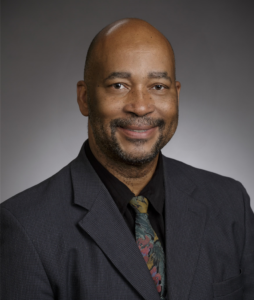Dr. Irvin W. Osborne-Lee
Professor of Chemical Engineering
Office: C. L. Wilson Building Room 200A1
Phone: (936) – 261-9406
Email: oslee@pvamu.edu
Curriculum Vitae: pdf
Biography:
Dr. Irvin W. Osborne-Lee is a professor in the chemical engineering department at Prairie View A&M University and has been a member of the faculty for over 24 years. Dr. Osborne-Lee has a B.S. (1979), M.S. (1983), and Ph.D. (1985) all in Chemical Engineering (1979) from The University of Texas at Austin (UT-Austin). At PVAMU, he serves as the graduate student coordinator in the department. He is member of the Faculty Senate Executive Board and is a member if the Institutional Review Board (IRB) for Research with Human Subjects. Dr. Osborne-Lee participates in many professional organizations including the American Institute of Chemical Engineers where he is a Fellow and also a founding member of the Minority Affairs Committee. Dr. Osborne-Lee is also a major supporter of student and faculty empowerment.
Research Interests:
Primary research interests are as follow.
- Renewable energy technology and customer adoption modeling studies
- Ecological impact modeling and studies for human activities
- Thermodynamic origin of life
Area of Research Expertise: Aerosol resuspension modeling, radioactive waste management, transportation risk analysis, monomer-micellar equilibrium theory and modeling, nuclear science and forensic analysis.
Current Research
- Integrated Design for Environmental and Climate Justice Research (IDEA-CJR) to strengthen resilience in previously segregated communities in the Gulf Coast Region and the City of Houston most impacted by the compounded effects of environmental injustice over time.
- Distributed Energy Resources Customer Adoption Models, this work compares the contemporary energy resource models and investigates the extent to which renewable energy sources are feasible for adoptions by local or region. Learning to use these systems can be a barrier to some modelers, so this work also explores available documentation and training modules to facilitate use of the tools on crucial and relevant problems.
- Environmental impact modeling, including human imprint studies. Ecological Human Imprint (EHI), sustainability, and environment form three points of the triangle of technology development. We integrate these three points that are the key to understanding how to improve global sustainability. The present research focuses on assessment of impacts of global issues of sustainability of human activities.
Recent Publications
- Anyaegbu, O. and I. Osborne-Lee, “Origins of Life from a Teachable Thermodynamics Perspective,” in progress.
- Pulikkathara, M., T. Adair, K. Kirby, R. Wilkins, B. Gersey, and I. Osborne-Lee, “Online Nuclear Power Summer Institute and Day of Science: A two-pronged approach to increasing girls and under-represented minorities towards STEM careers,” Proceedings of the 2022 ASEE Gulf Southwest Annual Conference, Prairie View, Texas. https://peer.asee.org/39193. (March 2022).
- Anyaegbu, O. and I. Osborne-Lee, “Thermodynamics and the Origin of Life,” Proc. NOBCChE 2020 Annual Meeting, Virtual Conference held September 24-25, 2020.
- Shakir Hanna, P. Obiomon, I. Osborne-Lee, G. Cesaretti, and R. Misso, “Global Solar Energy availability model and use in relationship to Ecological Human imprint: Economic Sustainability Impact and Assessment,” Proceedings of ICREPQ ’19, Tenerife, Spain (April 2019).
- Gyamerah, M., J. Lavan, I. Osborne-Lee, and S. Musa, “Finite Element Technique for Electrochemical Copper Deposition,” Proceedings of the 2019 COMSOL Conference in Boston,” (2019).
- Shakir Hanna, I. Osborne-Lee, G. Cesaretti, and R. Misso, “Ecological Human Imprint (EHI) and Water Resources in USA Modeling: Impacts and Assessment,” January 2019, Rivista di Studi sulla Sostenibilita, DOI: 10.3280/RISS2018-002005, January 2019.
- Shakir Hanna, I. Osborne-Lee, and M. Khalil, “Solar Energy availability model and use in relationship to Ecological Human imprint in Egypt: Economic Sustainability Impact and Assessment,” Proc. Intern. Sci. Conf. of Faculty of Science – Ain Shams University, Hurghada, Red Sea, Egypt (October 2018).
- Shakir Hanna, P. Obiomon, I. Osborne-Lee, G. Cesaretti, and R. Misso, “Global Solar Energy availability model and use in relationship to Ecological Human imprint: Economic Sustainability Impact and Assessment,” Proceedings of ICREPQ ’19, Tenerife, Spain (April 2019).
- Shakir Hanna, I. Osborne-Lee, and E. Ahlinvide. “Studies on the role of earthworms in bioremediation of motor oil,” Eur. Chem. Bull., 6(11), 491-503 (2017).
- Elmore, I. Osborne-Lee, R. Wilkins, and C. Marianno, “Answering the Scientific National Security Call: The Prairie View A&M University Approach to the Nuclear Forensics For Minority Serving Institutions Partnership,” Proceedings of the 2015ANS Winter Conference, Washington, D.C., (2015).
- Osborne-Lee, M. Gyamerah, and K. Olanrewaju, Development of Energy Efficient Process for the Capture of CO2 from Post-Combustion Coal Fired Power Plant Flue Gases Using a Novel Solvent, 2015 Carbon Management Technology Conference (ISBN: 978-0-8169-1093-9).
- Wilkins, I. Osborne-Lee, and B. Gersey, “Radiation Research and Nuclear Forensics Curriculum Development at Prairie View A&M University,” DNDO ARI Program Review, (July 7-9, 2015).
- Elmore, I. Osborne-Lee, R. Wilkins, and C. Marianno, “Answering the Scientific National Security Call: The Prairie View A&M University Approach to the Nuclear Forensics For Minority Serving Institutions Partnership,” Proceedings of the 2015ANS Winter Conference, Washington, D.C., (December 2015).
- Osborne-Lee, M. Gyamerah, and K. Olanrewaju, Development of Energy Efficient Process for the Capture of CO2 from Post-Combustion Coal Fired Power Plant Flue Gases Using a Novel Solvent, 2015 Carbon Management Technology Conference (ISBN: 978-0-8169-1093-9).
- Wilkins, I. Osborne-Lee, and B. Gersey, “Radiation Research and Nuclear Forensics Curriculum Development at Prairie View A&M University,” DNDO ARI Program Review, (July 7-9, 2015).

